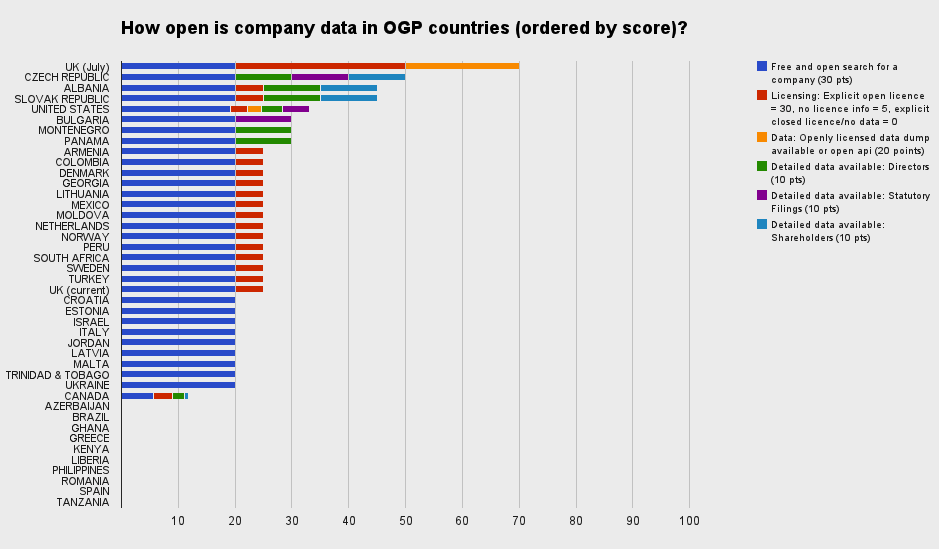Unfair business practices supported by government secrecy new report warns
Open Government Partnership countries score badly on promoting corporate transparency
 London/Brasilia, 17 April 2012 – Private corporations around the world are benefitting from undue levels of secrecy around company registers making it impossible for the public to know how businesses are structured and who really owns them, according to a new report released today by the organisation OpenCorporates.
London/Brasilia, 17 April 2012 – Private corporations around the world are benefitting from undue levels of secrecy around company registers making it impossible for the public to know how businesses are structured and who really owns them, according to a new report released today by the organisation OpenCorporates.
OpenCorporates’ report, “The Closed World of Company Data” finds that of 55 countries surveyed, the average score for public access to the company register is just 21 out of 100 points. The UK scored highest by a long way with 70 points out of 100, followed by the Czech Republic with 50 points, with the Slovak Republic and Albania (45 points each) also giving good public access to companies registers.
The United States scored badly with just 33 points and several of the world’s most important economies scored 0 points – notably Spain, Greece and Brazil. What this means in practice for members of the public is that even basic company data is not available without registering and often paying a fee to access even a single company record.
“Denying the public access to full company registration data is likely to support unfair business practices and even corruption because there cannot be proper scrutiny from and accountability to shareholders or the general public,” said Chris Taggart of London-based OpenCorporates.
The 55 countries surveyed are all members of the Open Government Partnership, a club of leading democracies meeting today in Brasilia to discuss how to advance transparency and openness.
OpenCorporates is calling on the governments to pledge to make corporate registers public to fulfil one of the five “grand challenges” of the OGP initiative which is to improve corporate accountability.
Endorsing the OpenCorporates call for greater access to company registers, Helen Darbishire of Madrid-based Access Info Europe noted that “Two major factors in the current financial crisis have been lack of government transparency and lack of corporate transparency – and this crisis has been most severe precisely in those countries where we see a nexus of the two problems, countries such as Italy and Spain.”
Access Info Europe also noted that even in countries where some data is available, the Closed World of Company Data report has identified multiple obstacles to public access to and scrutiny of the data such as permitting searches only one record at a time, needing to know the company number to run a search, and data available in non machine-readable formats such as PDFs which cannot be processed and cross referenced with other data sets.
Access Info Europe supports the recommendations in the Closed World of Company Data that specific company registration data should be mandatorily public, including:
1. Verification that the company exists: its current legal name, jurisdiction or registration, and the ID given by that jurisdiction (sometimes called a company number), the incorporation date, and the registered address;
2. Directors and officers of the company – names of individuals or other corporate entities who direct and run the company, and who are legally responsible for it;
3. Statutory reports – the official filings that must be made, for example, annual reports, annual accounts, change of directors, change in name, increase in share capital;
4. Significant shareholdings and corporate hierarchy relationships. This information is essential to understand the company – for example, what’s the parent company or companies, and, potentially, the beneficial owner, critical in anti-corruption and anti-money-laundering.

